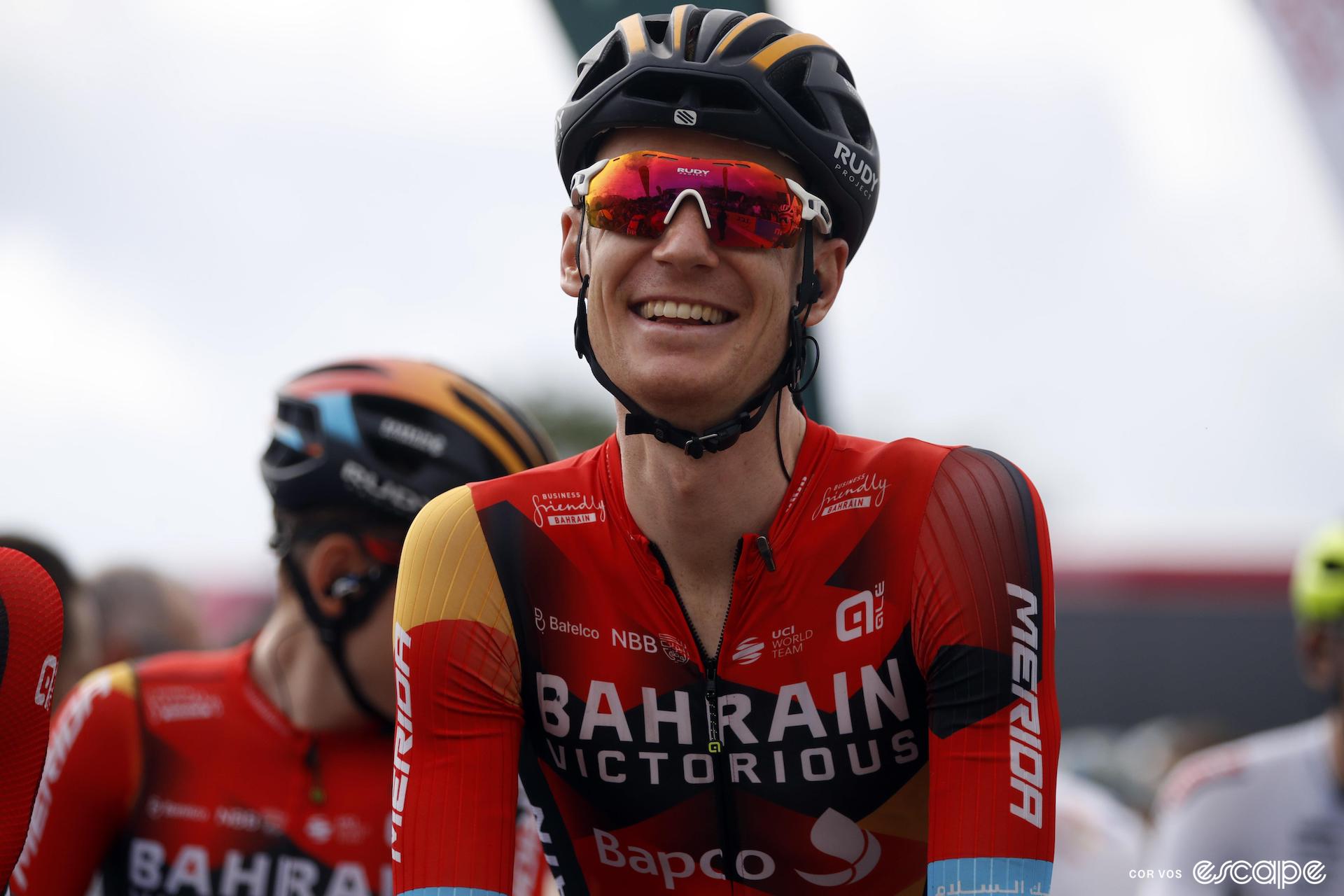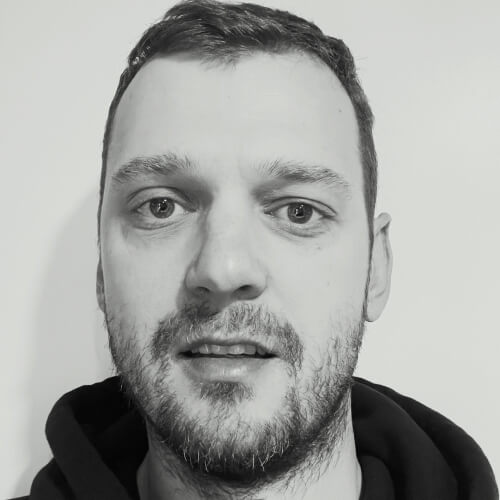It’s nearly eight years since Jack Haig last came home to Australia. The last time he was here he raced the final stage of the 2016 Herald Sun Tour down at Arthurs Seat, rode back to Melbourne (a 230 km day), got on a plane, and didn’t come back. In the years since, he’s fully embraced the life of a European-based professional bike racer, staying on the continent year-round.
In early 2024 though, the 30-year-old has done things a little differently. This time he came back to Australia to race the Tour Down Under for the first time since 2015. In that last appearance he was racing for the UniSA-Australia National team, in the season before joining the pro ranks with Orica-GreenEdge (now Jayco AlUla). Nowadays he’s one of Bahrain Victorious’s biggest names; a strong climber with a Grand Tour podium to his name.
“It was probably about time that I came back to Australia, to be honest,” Haig told Escape in the Hilton Hotel in Adelaide, just before the men’s Tour Down Under got underway. “I finished my [2023] season in the middle of September and the Canadian one-day races, so it was quite early. So then I had a bit of a break earlier, so then I started training earlier, which then makes it easier to come to Down Under.
“I also took the opportunity to come back and see some friends and family in Melbourne. Getting to see some familiar faces in the cycling community in Australia here is also quite nice.”
Haig didn’t race the Australian Road Nationals the week before TDU – he said that the only real appeal of Nationals is winning the green and gold jersey, and that that’s incredibly difficult when Jayco AlUla bring such numbers to the race. Instead Haig came straight to TDU, a race where he would have been “really happy” with a top five on GC.
That wasn’t to be – he finished 10th in the end – but it’s not terribly surprising Haig wasn’t at his very best. As with other top Australian riders, there’s a tricky balance for Haig to find between wanting to do well at the biggest race on home soil, and also wanting to peak for the bigger races back in Europe – races his team wants him to do well at.
“I think you start seeing more and more of the bigger GC guys not wanting to race early [in the season],” Haig said. “When you look at the startlist here [at TDU] now, Jai Hindley, Ben O’Connor are not here, who are [both] Australians that I imagine would like to do well here. But with the way that racing is going and the calendar’s going, you’re seeing people like Primož [Roglič] … his first race is going to be Paris-Nice and he’s gonna race, I think, two or three times before [the] Tour. And it gets harder and harder to try and fit in an early race like Down Under into a program like that.”
After Tour Down Under, Haig headed across to Victoria where he rode the Cadel’s Race People’s Ride, before doing a couple of stints in TV commentary with Channel Seven for the men’s Cadel’s Race (his team didn’t take part in the race). Despite his inexperience as a commentator, Haig was impressively entertaining and informative on the mic, as pointed out by multiple Escape readers and social media commenters that evening.
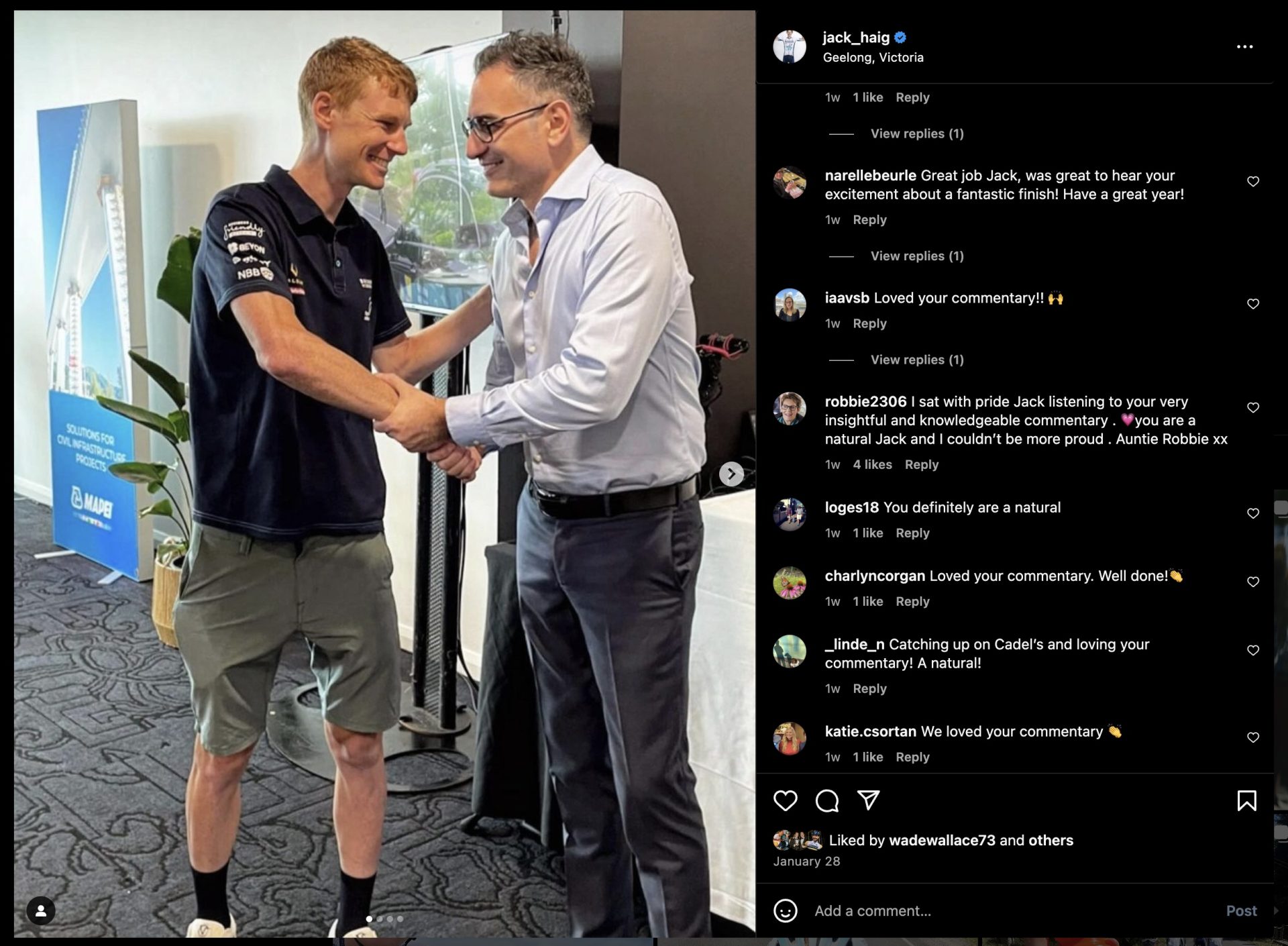
There’s a bit of change afoot at Bahrain Victorious this year. The team’s biggest GC name, Mikel Landa, has departed for Soudal Quick-Step. Haig says that Landa will be missed, particularly as a rider “capable of doing top five in any stage race that he lines up to”. But Haig can also see the potential opportunities that Landa’s departure creates.
Not just for him, but for Pello Bilbao (sixth at the Tour de France last year), for emerging Colombian Santiago Buitrago (a two-time Giro stage winner), and for Norwegian recruit Torstein Træen.
Haig’s excited by the possibility of more GC leadership opportunities, but maybe not as much as you might expect.
“The sport’s moved on since I first signed with the team,” he said. “Now you kind of have these four or five guys [the likes of Tadej Pogačar, Primož Roglič, and Jonas Vingegaard – ed.] that are quite a big step above. And if I’m brutally honest, they’re better than me. So it’s becoming harder to compete for a top result. But I still want to try and be that step just below them.”
Haig admits it’s frustrating that riders like Roglič, Pogačar, and Vingegaard are that much better than anyone else. But he also believes it’s good for the sport, “having these guys at such a high level showcasing such entertaining racing”. It’s just that it’s getting harder for other riders to win races now, “or even do really well in them”.
So what’s the solution? How does someone like Haig approach that challenge?
“I guess it’s just trying to always refine all the small little details,” he said. “And I know, even if I refined them all, I’m probably not going to be at that level. If you can do a top five now in a WorldTour stage race, I think it’s seen as a really, really good result. Because you always have one or two or three of these four or five guys, that is really a step above.”
The way Haig sees it, many teams are starting to adapt to this new paradigm. Winning the biggest races is almost impossible for most squads and so they’ve tried to find success elsewhere.
“In the Grand Tours now, I think teams are realising that it’s much better to be a bit more opportunistic,” he said. “Like us [Bahrain Victorious], last year in Tour de France, we didn’t necessarily go there with a big GC plan, but it was always in the back of our mind. It was more about trying to look for stage wins.
“In the end Pello [Bilbao] got into a breakaway, he got a little bit of extra time. And he ended up fifth or sixth on GC, which was a great result. And then we also had three stage wins. So I think the team was incredibly happy with that. And that will probably be a similar approach we take going forwards into the Tour de France [this] year.”
Adapting is something that Haig has always done throughout his career. He’s a rider who’s always cognisant of emerging trends in the sport, and is always looking to maximise his efforts where he can. At the moment, he’s looking at how he can refine his race calendar. That’s in response to a change he’s seeing in the way teams and riders are approaching training.
“Last year, I just did a lot of race, recover, race, recover, race, recover, and like, I never really trained,” he said. “We did an altitude camp before Tour of the Alps, and I did Tour of the Alps, then you recover a little bit because we went to the Giro, then I went to the Dauphine, then I went to the Tour. That’s what, four months there where I basically didn’t train.
“[I’m] trying to figure out now ‘OK, so if you have a big period of training, how do you do that properly, to then arrive at the next race in the best possible condition?’ Because now I think the way of thinking has changed from using races to prepare. Now it’s more about trying to understand how best to do the training in the most efficient way. The minimum effective dose of training to get to the level that you need to be to compete.”
As you might expect, a greater focus on training means an even greater emphasis on the importance of altitude camps.
“Teams now are definitely pushing out to doing that three-week altitude camp, whereas previously, sometimes teams just [did] 10 days or 12 days,” Haig said. “But I think teams now are realising that it needs to be three weeks, and it needs to be probably twice before you want to do well. Two, three-week periods.
“It’s getting a bit more demanding. That’s probably why you see less race days as well.”
Many riders already dread the isolation and monastic focus that altitude training camps demand. Increasing the amount of time spent at such camps isn’t likely to be popular, particularly for riders, like Haig, who have kids back at home. (Haig and his partner Anna have a young son, Liam).
“It’s definitely getting harder, and last year was really, really hard to be honest,” Haig said. “But then, on the flip side, because I finished my racing season quite early, before I left to come to the December training camp, my wife said it was probably the longest period I’ve been at home without leaving. It was from basically September 10 until December 10.
“Now I’m away in Australia a month more or less, then we have a training camp when I come back, and then you do Andalucia [Ruta del Sol], then you come back a little bit, Paris-Nice, come back a little bit, Catalunya, and then altitude camps start. You end up spending a long time away from the family. And it is hard.
“But now also, with FaceTime, everything like this, now every single afternoon I’m on the massage table and it’s breakfast time at home before my son goes to school. And he has breakfast and we hang out. So there are ways to manage it but it’s not easy being a father and [having] so much time away.”
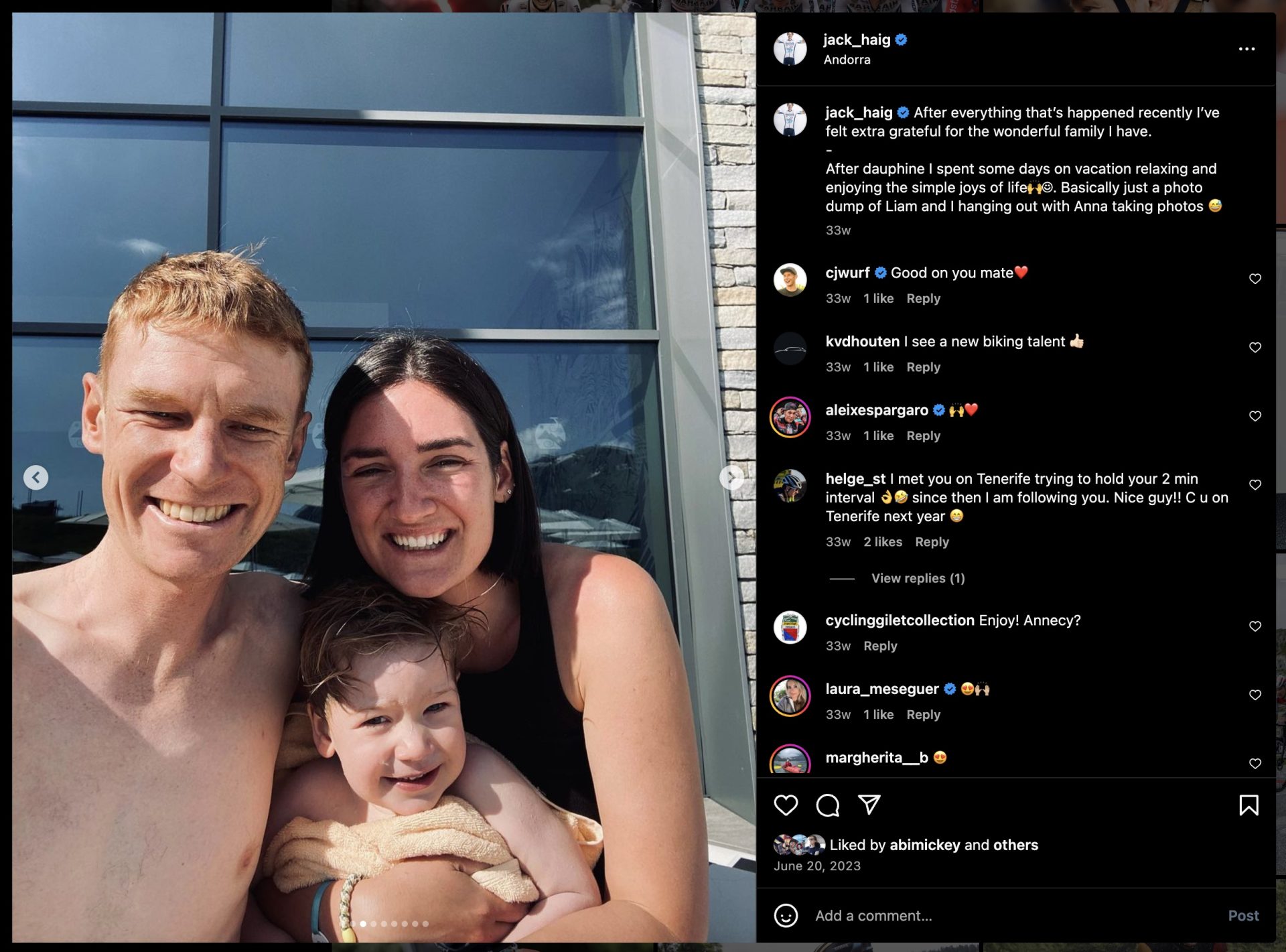
Haig is philosophical about the whole thing. It’s hard at the moment, but he knows that this period of his life won’t last forever, and that the pain now could lead to greater happiness later on.
“[I] see it as a sacrifice in a small window of my life that then in the future, hopefully, I’ve done well enough in cycling, that I’ll be able to spend more time with my family and not have to work too much,” he said. “So it’s a small sacrifice now for hopefully a better future.”
Haig thinks he’ll probably retire somewhere around 36-38, the age he sees most professionals hanging up their wheels. He’s only 30 now, but he’s already thinking about what life might look like after cycling.
“Even just small stuff like what I’m going to do at Cadel’s Race [TV commentary],” he said. “Just kind of dipping my toes into a couple different things just to see. I’m not sure if I want to stay in cycling when I stop or not but I’d like to keep my options open and start to talk to some guys.
“I was just speaking with [former teammates] Daryl Impey and Sam Bewley. They’ve just recently retired and they’ve moved straight into cycling [as sports directors at Israel-Premier Tech], just trying to get people’s experience. Because I think it’s super weird when you retire from cycling, and you go and try and find a real job. What have I done for the last, what it’ll be, 16 years? I’ve ridden my bike.”
Haig finished high school but when he graduated, he wasn’t quite sure what he wanted to do next. He gave himself some time to figure it out.
“I wanted to give myself until I was 21, which is then the mature-age [university] student age in Australia,” he said. “I said, ‘If I don’t have something, whether that’s cycling-related or job-related or anything, or a pathway in life by 21, I go back to university.’ And I signed my contract with GreenEdge when I was 21.”
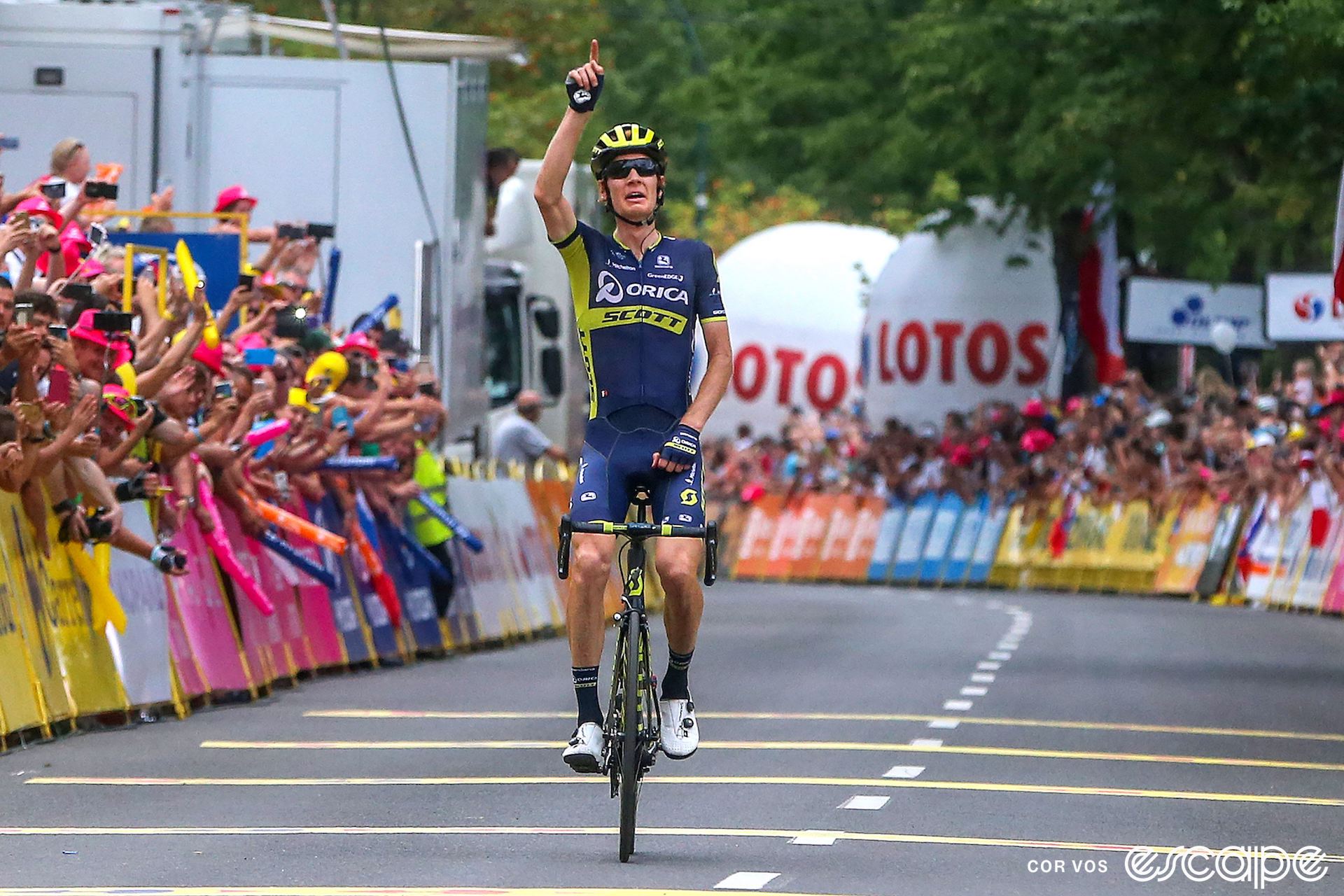
Back before he turned pro, if Haig had gone to university, he likely would have studied outdoor education. If he was to go back to study nowadays, he’d be far more interested in finance.
“I have a real passion for personal finance and making sure that I don’t need to work that much after my career,” he said. “Unlike maybe some people that turned professional, I worked a few jobs in my teenage years and I remember there was one distinct job [where I] was working in retail, and I had this epiphany that if this was going to be my life for the next 45 years, I didn’t want it. I didn’t want to have to wear these stupid black shoes, this button-up shirt that I hated.”
Haig resolved that he would never work a “proper job”. He ended up in cycling, and ever since, he’s closely managed his own finances in the hope that he won’t have to work a regular nine-to-five when he retires.
“It’s something that I think is maybe missed a little bit from the cycling management agent’s side towards the athletes,” he said. “I think a lot of athletes don’t know what to do with the income that they get. We earn more money than a normal person, but it’s for a short period of time. I think a lot of people, especially young cyclists, maybe don’t understand the concept of ‘This isn’t for the next 40 years, and you’re not going to have this money until you’re 65’ and that it can end basically whenever.”
If it all unfolds the way Haig wants it to, he’ll have another six to eight years in the professional peloton. So what does he want to achieve in that time? His career highlights so far include third overall at the 2021 Vuelta a España, a stage win at the Tour of Poland, and at the Ruta del Sol. What else would he like to add to that list by the time he retires?
“I guess I’m not so goal-driven,” he said. “I’m more like a process-driven person. And maybe it’s a little bit to my detriment at some points, because you see some guys that are really motivated by results and are really competitive people. I’m maybe not such a naturally competitive person and more of a process person. It’s more about self improvement, I guess, and learning.”
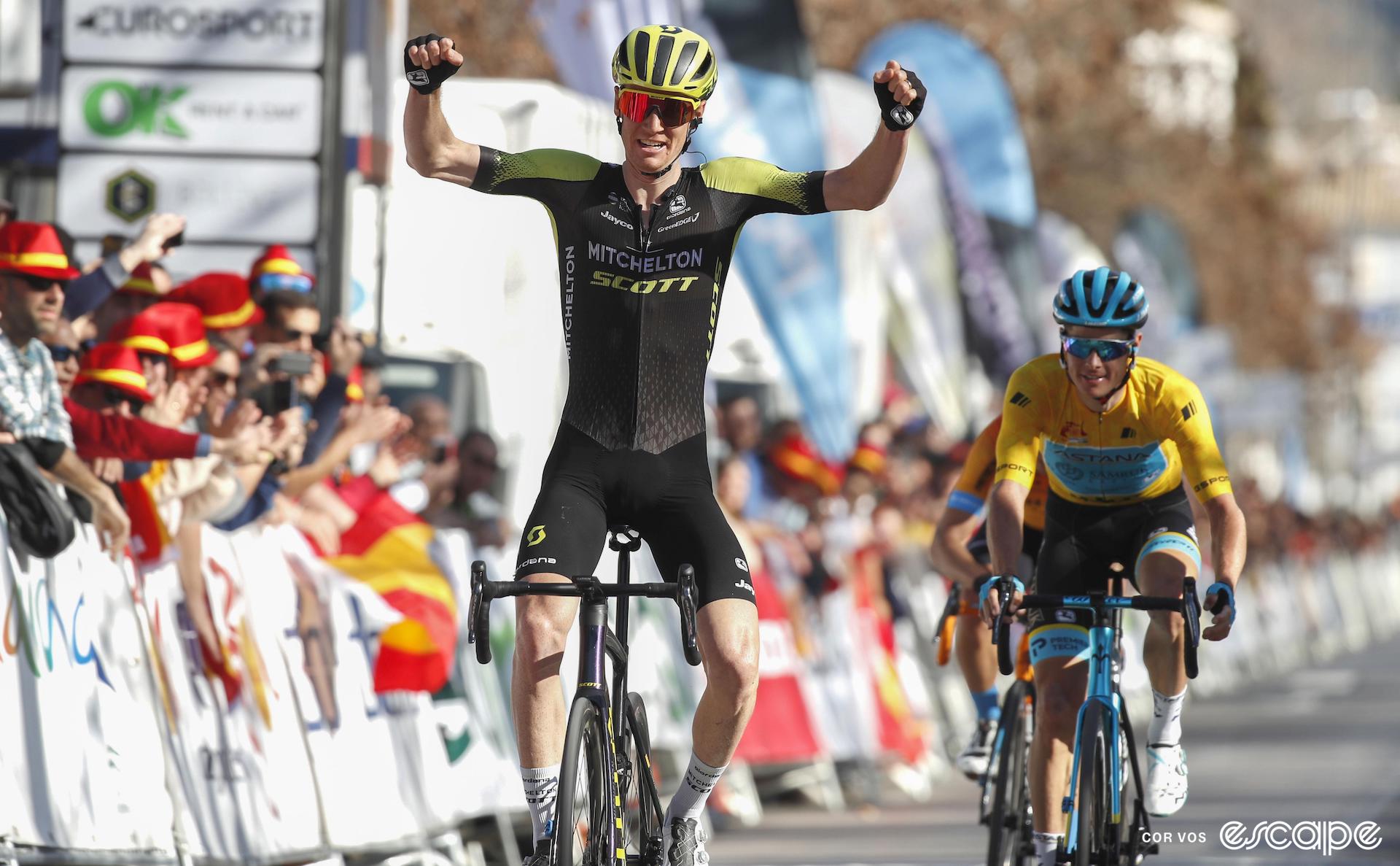
Since chatting to Escape, Haig has wrapped up his time in Australia and headed back to Europe to begin his season proper. He’ll soon line up at the Ruta del Sol (February 14-18), Paris-Nice (March 3-10), and then the Volta a Catalunya (March 18-24). He’ll likely race some or all of the Ardennes Classics (mid April), before hitting the Criterium du Dauphine (June 2-9) and then the Tour de France (June 29-July 21). Depending on how things shake out after that, he might end up at the Vuelta a España (August 17-September 8) as well.
While Haig isn’t as goal-driven as some of his peers, that’s not to say he has no ambitions this year at all.
“I’m just tired of having a bit of bad luck, to be honest,” he said, likely referencing his DNFs at the 2021 and 2022 Tours de France, with a broken collarbone and broken wrist respectively, a crash at last year’s Giro, and more. “If I could be top five in one of Paris-Nice, Catalunya, Dauphine – one of those … And then I would like to win a stage in a Grand Tour. Those two things would be pretty nice.”
For most riders, a season like that would be a banner year. It would be for Haig too; a rider who’s frequently found inside the top 10 in WorldTour stage races (he was fifth at the last three editions of the Dauphine), but a rider who’s now gone several years without a victory. A big win, a big season – both would be a welcome reminder of the 30-year-old’s considerable talent, and a step forward in his continuing career.
For now though, Haig will stay focused on the process. He’ll continue making the improvements that are within his grasp, focusing his energy on the things he can control. Among those things: simply being the best he can be, all with the goal of ensuring a happy future for himself and for his family.
Disclosure statement: Jack Haig is a paying, founding member of Escape Collective.
What did you think of this story?
